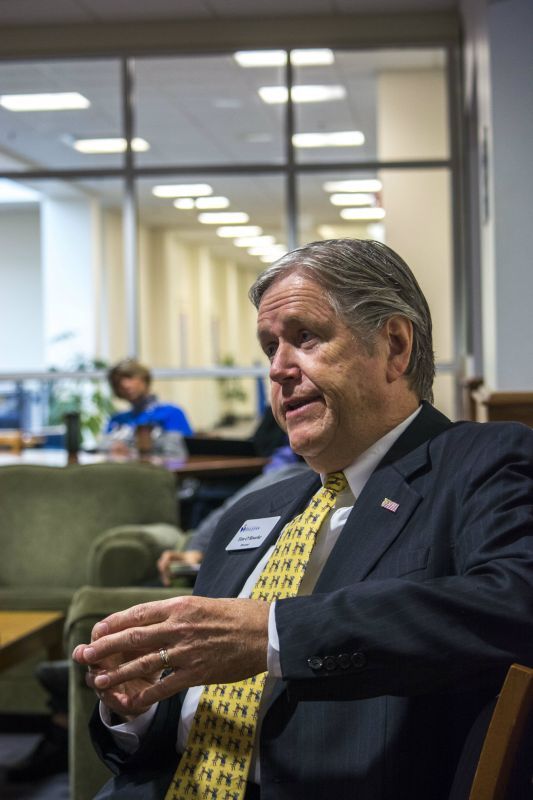Share this Story
Virginia Wesleyan Hosts Final Meeting of C4 Consortium
A grant from the Teagle Foundation enables pursuit of a more compelling curriculum
Featured News | February 8, 2017
View
 Faculty representatives from four institutions of higher education gathered at Virginia Wesleyan January 29-31 for the fourth and final meeting of the . The Consortium is a partnership among three private colleges and one university in pursuit of creating a more coherent and intentional curriculum with goals, pathways, and outcomes that are clear to students and other constituencies. The work of the C4 Consortium, comprised of faculty from Davis and Elkins College, Eckerd College, Shenandoah University and Virginia Wesleyan College, has been supported by funding in the amount of $280,000 for over 30 months (January 2015 through June 2017).
Faculty representatives from four institutions of higher education gathered at Virginia Wesleyan January 29-31 for the fourth and final meeting of the . The Consortium is a partnership among three private colleges and one university in pursuit of creating a more coherent and intentional curriculum with goals, pathways, and outcomes that are clear to students and other constituencies. The work of the C4 Consortium, comprised of faculty from Davis and Elkins College, Eckerd College, Shenandoah University and Virginia Wesleyan College, has been supported by funding in the amount of $280,000 for over 30 months (January 2015 through June 2017).
Since the grant’s inception, the C4 Consortium has sought to answer, individually and collectively, three overarching questions that focused on a coherence agenda, purposive faculty governance, and the value-added partnership. VWC Provost and Vice President for Academic Affairs Timothy O'Rourke has been the driving force behind this initiative.
"We're grateful for this Teagle Foundation Grant which has enabled us to collaborate with higher education partners to agressively pursue the development of a more coherent and intentional curriculum," says O'Rourke. "We began by identifying the characteristics of a coherent liberal arts curriculum and asking how can curricular architecture be modified to ensure that students develop readiness competencies for high impact practices, follow clear pathways to degree and make timely progress toward graduation?" O'Rourke indicated that the Consortium also explored the most effective ways for bringing faculty together to consider and understand the value of curricular change and the kinds of cooperative actions or mechanisms of innovative governance needed to implement change. In addition, the members of the Consortium explored how to pool their collective experiences to provide persuasive answers to these questions and then disseminate the answers to the greater higher education community.
Each institution in the Consortium has developed and implemented a major curricular reform initiative as part of this process. Though each has approached comprehensive curricular reform in different ways, all initiatives have involved systemic institution-wide change and have emphasized high-impact practices. Support from the grant has enabled Davis & Elkins College to refashion the curriculum so that there are now clear major pathways from freshman year to degree completion. Eckerd College’s focus has been on the diffusion across the curriculum of innovative forms of outward-facing student work such as digital portfolios and the development of assessment processes for Writing Intensive and Reflective Service Learning courses. Shenandoah University is restructuring its general education curriculum toward a more broadly integrated, thematic program, enhancing interconnectedness among faculty and creating vibrant linkages between the University and the community.
Virginia Wesleyan College’s Quality Enhancement Plan (QEP) emphasized the expansion of student participation in study away, undergraduate research, and internships. The Teagle grant has enabled VWC to restructure the curriculum around these high impact practices, engage in curricular mapping and initiate a pathways program that results in culminating experiences and connects students to career opportunities. The College is also undertaking general studies reform and the creation of institutional learning outcomes that will bring additional coherence to these efforts.
During the last two years, members of the C4 Consortium have convened at Eckerd College (March 2015), Davis & Elkins College (October 2015), and Shenandoah University (April 2016)—after having met originally in a pre-grant planning session at Virginia Wesleyan in June 2014. Consortium meetings have featured presentations by some of the nation’s leading reformers in higher education, including. Robert Zemsky, George Kuh, Tia Brown McNair, and Josipa Roksa.
The program for the Consortium's final meeting in January included featured speakers Linda Nilson (Aligning Curricular Design and Classroom Learning) and Paul Gaston (The Coherence Agenda). In addition, there were presentations from each campus and final project outcomes and impacts on the curriculum, faculty governance, and student learning were shared. Marty Sharpe, featured facilitator, led a focused discussion on project effectiveness, impacts, and lessons learned. There was also a conversation with Madeleine Green, Teagle Foundation Senior Program Consultant, who has provided feedback to the Corsortium throughout the process. At this final meeting, the group planned next steps for the grant’s completion, assessment, final report and other projects for the future.In the next few months, the grant partners anticipate additional collaborative presentations and publications and all of the C4 institutions will be represented at the Teagle Foundation meeting in New York in April 2017.

